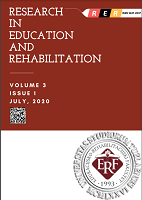SOCIO-PEDAGOGICAL ASPECTS OF CYBERBULLYING IN HIGH SCHOOL STUDENTS
SOCIO-PEDAGOGICAL ASPECTS OF CYBERBULLYING IN HIGH SCHOOL STUDENTS
Author(s): Edin Muftić, Ranko Kovačević, Adela Jahić, Edina Kuduzović, Melisa Muminović-VildićSubject(s): School education, Behaviorism, Studies in violence and power, ICT Information and Communications Technologies, Pedagogy
Published by: Edukacijsko-rehabilitacijski fakultet Univerziteta u Tuzli
Keywords: students; high school; internet; behavioural problems;
Summary/Abstract: Excessive and uncontrolled use of the internet while neglecting other agents and aspects of socialization with the lack of awareness of the risks of this use, negatively affects the proper psychosocial development of young people, it can also negatively affect the strengthening of their competencies and general alienation. The aim of this research within the project of the Federal Ministry of Education and Science, significant for the Federation of Bosnia and Herzegovina, which was realized in 2019 in the Tuzla Canton, Central Bosnia Canton and Sarajevo Canton, was to investigate and establish the frequency and risks of improper and uncontrolled Internet use and their connection with certain forms of disorders in behaviour. The research was conducted on a sample of 333 high school students in these cantons, both genders, aged from 15 to 19. The results showed that 92.2% of students have access to the internet and that they use it every day mainly for the purpose of chatting and entertainment. Students are generally not sufficiently familiar with the dangers and risks of the internet. 8.7% of students experienced cyberbullying, which resulted in various manifestations of stress reactions. 1/3 of the respondents are not sufficiently aware and responsible when communicating/chatting and in the same proportion neglect their regular obligations due to uncontrolled use of the internet. The results of our research are significant in terms of providing a more detailed insight into the researched issues and facilitating the provision of recommendations and guidelines for improved solutions, as well as for possible further research.
Journal: Research in Education and Rehabilitation
- Issue Year: 3/2020
- Issue No: 1
- Page Range: 30-50
- Page Count: 21
- Language: English

